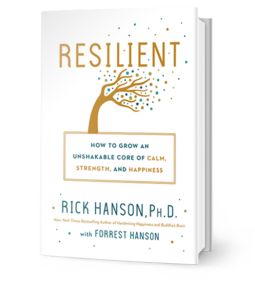
Resilience
Is it possible to indicate specific brain circuits that make you more resilient?
In the nervous system, low resilience can be the result of several things, including an overreactive amygdala, weakened hippocampus (which helps regulate the amygdala), poor connectivity between the PFC and the amygdala, and low activity of the parasympathetic nervous system (PNS). On the other hand, high resilience can be the result of these parts of the brain operating in opposite ways, such as having high activity in the PNS. Positive changes in these four brain regions or systems can be produced by sustained mental/psychological practices such as those explored in my book Resilient.
Can you strengthen certain circuits in the brain to get more resilient?
Much research shows that we can definitely change the brain for the better. As the “hardware” of the brain improves in key regions such as the prefrontal cortex (PFC) behind your forehead, that part of the brain becomes more effective. For example, if a person is being challenged by stressors, improved regulation of the amygdala – sort of the alarm bell of the brain – by the PFC can help a person feel calmer under pressure. Just because there is a stressor does not mean we need to feel stressed, and improved brain function is like a shock absorber between us and the world.
Can we hardwire our brains to be grittier the same way we can hardwire them to be happier?
My hyper succinct two-word answer is: “You bet!”
And to expand a bit: any kind of learning – including emotional, social, motivational, and character learning – must involve changes in the brain. This means that grit – resilience, determination, persistence, hardiness, courage – gets developed through changes in neural structure and function.
We develop more grit through having repeated experiences of determination, endurance, resolve, perseverance, and sheer survival that get woven into the fabric of the brain – and thus one’s life.
My question is about resilience and how to find agency in a world where we seem to be failing in so many ways (environmentally, politically).
The issue you raise is at the white-hot center of socially engaged life these days and always. I sure don’t have the answer, though I do have some personal answers. I try to explore some of them in my book, Resilient, including in the sections on “Agency, Make Your Offering”, and “Aspire Without Attachment”. As to the essence of the matter, my personal approach is to sustain wise action with as little “friction” as possible: the damage to oneself and others of getting stressed, anxious, and angry. The art of course is to tap into healthy outrage, fieriness, fierce compassion, moral disgust, etc. without getting sucked into the “poisons” (Buddhist reference) of ill will, hatred, contempt, us-against-them tribablism, etc.
It can be helpful to bring to mind admired models of this sweet spot – badass but not pissed off, alarmed but not immobilized, compassionate toward them but also toward oneself – and then imagine “channeling” them or tuning into some aspect of how in the world they stay in that sweet spot.
Meanwhile, we fight the good fight and do what we can. And stay happy meanwhile; they may have our White House, but they never need to have our minds.
Could focusing on the resiliency of a person be similar to bringing up a positive experience and pairing it?
The key is to bring up a rich experience – in this case of a nurturing being – whether it is someone today or someone from the past when the trauma occurred. Just remembering that someone was helpful in the past (you didn’t say this, I am just mentioning this here for clarity) would not have the same impact in implicit memory as bringing up the experience of that soothing in the past, or an experience of soothing here and now.
So I don’t think there is an inherent distinction in the power of experiences of past or present soothing/resilience: past or present could be more or less powerful depending on other details. For example, when I bring up the felt sense of people in my childhood who were really for me, even though that emotional memory is less intense than that of my wife’s support for me these days, in some ways it (the childhood memory) goes deeper since it happened when I was a kid.
My own process is to feel the pain for sure, held in a big open space of awareness when I can, but also really focus on internalizing positive resources (mainly from positive experiences); check out the material on my website on taking in the good. In other words, be with the weeds in spacious mindful awareness while also diligently planting flowers in the garden of your mind/brain. Over time, the flowers will gradually crowd out the weeds.
Can you help shed light on how we live our aspirations whilst not being selfish?
Check out the Aspiration chapter in my book, Resilient.
In brief, healthy aspirations take into account our duties to others…and to ourselves. To simplify, duties are “have to” while aspirations are “want to.” Also check out Mother Nurture and my writings about sharing the load fairly when kids come along.
This said, in many people’s lives (though sadly and often unjustly, there are many exceptions), after handling duties there is still attention and time and often other resources available for personal aspirations – especially when we consider the power of many little moments of practice, and the power of relatively small amounts of time each day – 15 minutes? an hour? – that really add up over months and years.

Additional Resources
Resilient by Rick Hanson, Ph.D. and Forrest Hanson
The Resilience Summit free online summit
Foundations of Wellbeing online program
The Science of Hardwiring Happiness and Resilience Jordan Harbinger podcast




